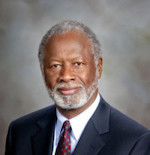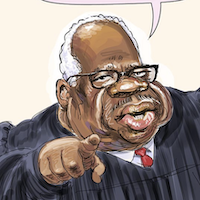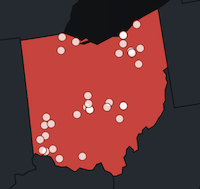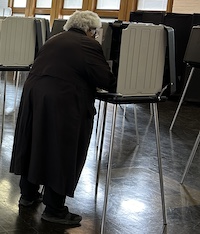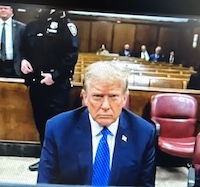The America First Policy Institute held a two-day forum in Washington, D.C. capped off with an appearance from former President Donald Trump — his first visit to the nation’s capital since leaving office.
“Our country is being dealt one historic humiliation after another on the world stage,” Trump said. “At home our most basic rights and liberties are totally under siege. The American dream is being torn to shreds and we will not have a country left if this economic, social, and attack on civilization itself is not quickly reversed.”
In a speech heavy on law and order themes, Trump proposed using the death penalty to fight drug crime.
“You execute a drug dealer and you’ll save 500 lives because they kill on average 500 people,” Trump asserted without evidence. “It’s terrible to say, but take a look at every country in this world that doesn’t have a problem with drugs — they have a very strong death penalty for the people that sell drugs.”
The organization, and others like it, constitute a kind of support network in waiting for a potential second Trump administration or future president pursing a Trump-style agenda. The institute serves as a way station for former Trump administration officials eyeing their next gig, as well as a training ground for the next generation of young conservatives.
Over two days of panel discussions, dozens of Trump acolytes laid out a vision for what the “America First” agenda looks like in defense, education, energy and other policy areas. Ohio faces showed up in discussions about voting and health care.
Voting
Former Ohio Secretary of State Ken Blackwell led off Tuesday morning with a panel on voting. He cast the state of American elections in perilous terms.
“We need citizens that really are ready to really take the battlefield — frontliners not sideliners,” he said.
The panel was titled “make it easy to vote and hard to cheat.” Blackwell laid out universal voter I.D. requirements and stringent voter roll maintenance as two steps in that mission to “protect the integrity of the ballot box.” The League of Women Voters highlight “discriminatory voter I.D. laws” and “unjust voter purges” as two examples of common voter suppression strategies they work to oppose.

And Blackwell has a dubious track record for someone advocating to make it “easy” to vote. A congressional report found “numerous, serious election irregularities in the Ohio presidential election, which resulted in a significant disenfranchisement of voters,” after the 2004 election. The report went on to state, “in many cases these irregularities were caused by intentional misconduct and illegal behavior, much of it involving Secretary of State J. Kenneth Blackwell.”
Less than a month before the election, Blackwell directed boards to reject voter registrations based on the weight of the paper on which they were printed. He also denied provisional ballots to voters who should have been eligible, and seemingly misallocated voting machines resulting in long lines in Democratic leaning precincts.
Throughout it all, Blackwell — the state official in charge of overseeing a fair election — served as state co-chair for George W. Bush’s presidential campaign.
The voting panel included U.S. Rep. Claudia Tenney, R-NY, Louisiana Attorney General Jeff Landry and West Virginia Secretary of State Mac Warner.
They decried the federal “takeover” of elections they see in the proposed legislation, HR 1, as well as so-called “Zuckerbucks” — the roughly $400 million in grants Facebook CEO Mark Zuckerberg gave to underfunded agencies for election administration.
Landry called those dollars “corrosive” and described how Louisiana was the only state to sue to stop them.
“It’s not the government’s job to entice the population to vote,” Landry argued. “It’s only the government’s job to ensure that every legal voter has an equal opportunity to access the ballot box, and every legal vote is counted. That’s it. That’s it.”
The grants, many of which were awarded by the non-profit Center for Tech and Civic Life, paid for election day administration as well as early voting and mail voting, poll worker training and recruiting, and voter education or outreach.
Secretary of State Warner voiced skepticism for 1993’s Motor Voter Law, arguing that with online voter registration readily available, allowing people to register at the DMV or other agencies will only lead to duplicates in the voter rolls. The vast majority of states have some sort of online voter registration, but eight currently do not.
Warner went on to relate a story from his son who served in Afghanistan. He described how before going on patrol the soldiers would put tourniquets on their arms and legs in case they were injured.
“Folks, you are America’s tourniquet right here,” Warner said.
“I don’t need the conspiracy theorists afterwards,” he went on. “It doesn’t do any good afterwards. Doesn’t do any good after you’ve been hit to go back home and then get the tourniquet. No, we need to be there right on the spot so when the bad things happen in Philadelphia, Detroit, Maricopa County, we can apply pressure right then.”
Healthcare
Later Tuesday, U.S. Rep. Brad Wenstrup, R-OH, spoke on a panel about health care. He joined U.S. Sens. Mike Lee, R-UT, and Mike Braun, R-IN, as well as U.S. Rep. Cathy McMorris Rodgers, R-WA, for the discussion with moderator Bobby Jindal, the former Louisiana governor.

The theme of their talk, “put patients and doctors back in charge of healthcare,” likely rings hollow for pro-choice activists still figuring out how to cope with a post-Roe America.
“If you’re going to make these decisions, then you need to see the patient,” Wenstrup said. That complaint about insurers requiring prior authorization was delivered without a shred of irony and in terms indistinguishable from those of protesters furious at state lawmakers limiting abortion access.
“You should not be making these decisions for a patient you have never seen,” Wenstrup went on. “To me that’s malpractice, and it’s occurring each and every day.”
The panelists emphasized opposition to the Affordable Care Act and the necessity of protecting coverage for people with preexisting conditions — that coverage was first guaranteed by the ACA.
Rodgers and Wenstrup also spent time promoting their measure to prohibit the use a metric for cost effectiveness and health outcomes known as “quality-adjusted life years,” or QALYs when determining coverage or payment. The rhetoric hearkens back to another fight from the ACA’s passage — the bogus claim that the law would impose so-called “death panels.”
“It just seems completely immoral to even invoke a system like this where you’re deciding basically who gets care and who doesn’t,” Wenstrup argued.
Wenstrup, who is a physician, also took time out to criticize federal efforts to mandate COVID-19 vaccination.
“Nothing is more egregious than the vaccine mandate,” Wenstrup said. “Look, I’ve been vaccinated I was for the vaccine it saved hundreds of thousands of lives. But the mandate? You have someone in politics who has no experience in medicine, telling you you must get this shot and if you don’t, you’re fired from your job? Is this America? It sure doesn’t sound like it.”
Follow
https://ohiocapitaljournal.com/2022/07/27/what-ohioans-had-to-say-at-the-america-first-policy-summit/





